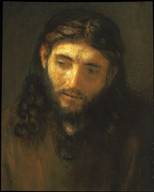The house in Emmaus
(Luke 24)
All this week we’ve been looking at scenes in the gospels
that record Jesus being present in someone’s house, and they remind us that although
crowds often flocked to Jesus, he also
went to where people were – and today he comes to us where we are in our
houses.
Today we read from Luke’s gospel – the account of
Jesus meeting 2 disciples later in the day of his resurrection as they walk to
Emmaus – a village about 7 miles from Jerusalem.
Earlier the disciples had sensed Jesus’ presence as they
walked along the road, but it was only when he broke bread with them that they
recognised him.
Breaking bread and giving thanks – such an ordinary thing,
that anyone would do as they ate together. I wonder how many times Jesus had
done this before. Maybe Jesus had a form of words that was immediately
recognizable. Maybe the 2 disciples were suddenly transported back 3 days to
that last supper when Jesus took bread, broke it and gave it to them; or
perhaps a year or two back when Jesus took 5 loaves and 2 fish, gave thanks,
broke them and gave them to the disciples to distribute.
In many churches the service of holy communion – the Lord’s
Supper, the Mass, the Eucharist, call it what you will – is the central act of
gathered worship. In some places it is accompanied by ceremony and ritual with
music and incense, in others it is much more humble, but at its heart is a
meeting with Jesus where bread is broken as a sign of his presence with us.
Some are finding it difficult to forego communion while we
can’t meet together physically, so we
have to make do with a virtual gathering together and a ‘spiritual
communion’. But even that can be
consecrated – made special – by the presence of the risen Jesus with us.
We’ve lost the idea of offering hospitality to strangers –
we are much more cautious and suspicious about who we let into our homes – and
sometimes with good reason. In the culture of Jesus' time, and still today in many parts of the middle east, it was normal and even expected to give hospitality to passing strangers. At the beginning of John’s gospel Jesus invites Andrew
and another disciple to come and spend the day at his place. Here in Luke the 2
disciples invite Jesus to spend the night at their place. And in both cases
Jesus makes himself known in a new a living way. Later Jesus meets the 12 and
as a sign of his real presence, he eats broiled fish with them. And later
still, though not in a house, Jesus cooks a fish breakfast for his disciples on
the shore of Lake Galilee.
When you have your next meal, make a point of inviting Jesus
to share with you, whether you’re on your own or with others. And who knows,
maybe Jesus will make himself known to you as he did to those 2 disciples in
Emmaus.


